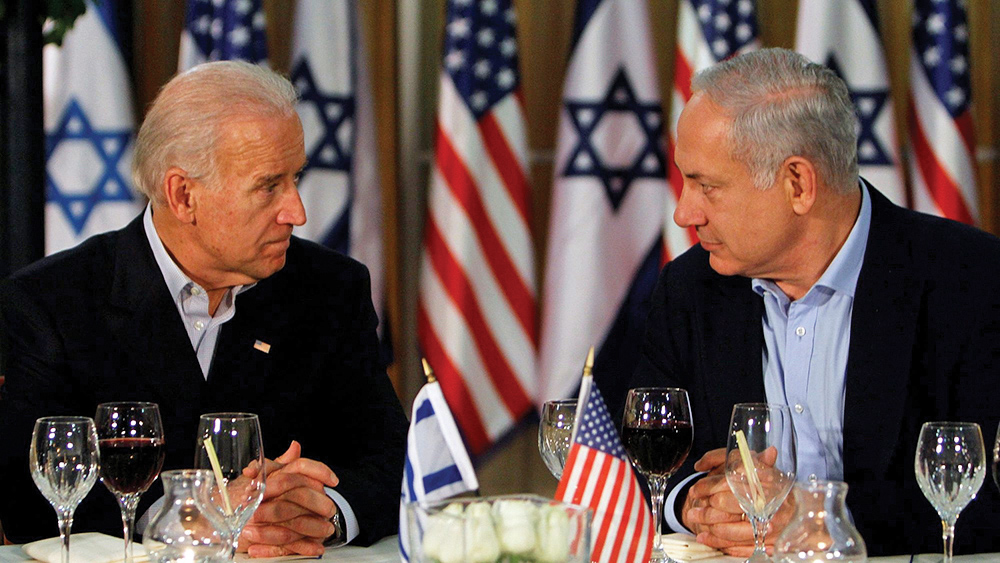Should we mark our calendars, or was this merely the vaguest possible way the White House could have talked about a meeting, without actually committing to one?
Amichai Stein/JNS.org

A famous Israeli song asks: “When you say no—what do you mean?” Many Israelis have been asking themselves a similar question since U.S. National Security Council spokesman John Kirby announced on Monday, July 17 that President Joe Biden had, seven months after the Israeli premier took office, finally invited Benjamin Netanyahu to the United States for an official meeting. Or had he?
The two leaders “have agreed that they will meet, probably before the end of this year, and all the details of the wheres and the whens are still being worked out,” Kirby told reporters.
When you say invitation, what do you mean?
Should we mark our calendars, or was this merely the vaguest possible way the White House could have talked about a meeting, without actually committing to one?
Biden has come in for increasing criticism in the United States in recent days over his failure to invite Netanyahu to the White House.
“What does Biden have against Israel?” asked a Wall Street Journal editorial, adding, “The president treats the governing coalition in Jerusalem worse than he does Iran.”
Abe Foxman, one of the leaders of the U.S. Jewish community, agreed, noting to this writer last week that Biden is willing to invite the leaders of non-democratic states to the White House, but not an Israeli leader.
Moreover, it would seem at this point that even if a meeting is ultimately held, there is no guarantee it will be at the White House. The transcript of the Netanyahu-Biden phone call read out by Kirby didn’t even explicitly mention an invitation or a meeting, while a transcript released by Netanyahu’s office said only that the president had invited Netanyahu for a meeting in the United States “soon.”
This has caused many to wonder whether the plan is for the meeting to be held on the sidelines of the United Nations General Assembly in September.
The Biden-Netanyahu call came four months after their last conversation. Despite this, the Israeli leader in recent weeks has been telling his public that the U.S.-Israel relationship remains strong. “I may not be in America, but America is coming here,” he has said.
But even he had to eventually admit that there are disagreements between the two countries, the most serious of which involves his government’s judicial reform push. The first of a series of bills in the reform package, expected to pass its third and final Knesset reading next week, seeks to limit the Israeli Supreme Court’s ability to overturn government decisions and nominations based on the principle of “reasonableness.”
“I told President Biden that a vote will take place next week on the first part of the judicial reform,” said Netanyahu, according to the statement from his office. Biden replied that he believes “there is need for a compromise and a broad agreement” when it comes to judicial reform, according to the statement.
From Biden’s recent CNN interview to outgoing U.S. Ambassador to Israel Thomas Nides warning Israel is “going off the rails” to New York Times columnist Tom Friedman calling on the U.S. administration to reassess its ties with Israel, it seems as though the United States is trying to pressure Netanyahu to halt the legislative process. So far without success—the government’s message to date is, “We’re going all the way.”
However, this week the U.S. president will hear a call for “broad consensus” from another Israeli leader: President Isaac Herzog.
Herzog is scheduled to meet Biden today at the White House, and tomorrow he is to address both Houses of Congress. His speech will address U.S.-Israel ties—“the unbreakable bond,” as many call it. The Israeli president will say he represents the Israeli people, not a government or party.
Iran will also be addressed; Herzog plans to reiterate the Israeli stance, namely that Iran must not be allowed to obtain nuclear weapons and that the United States must not reach a new nuclear agreement with Tehran. These statements will echo those Herzog makes today in the Oval Office. The Palestinian issue, settlers violence and the recent terror wave against Israelis will be part of Herzog’s discussion with Biden, too.
The two leaders may also discuss a topic many in Israel are wondering how the current Israel-U.S. crisis may impact: Israel’s entry into the U.S. Visa Waiver Program.
Israel has until October to fulfill a series of demands to enter the program. Israeli and U.S. officials working to advance the project have told JNS that the effort is “continuing as normal,” and this week a U.S. delegation will visit the Jewish state to examine how it will allow entry to Palestinians with U.S. citizenship—one of the main requirements to enter the program.
However, in recent days some Israeli officials have begun questioning whether the judicial reform crisis could affect Washington’s final decision.
“Right now everything is working according to plan,” one official told me, “but when the U.S. talks about values, there is always a chance that when we reach the crucial point of yes or no, this will affect the answer.”
Amichai Stein is the diplomatic correspondent for Kan 11, IPBC. This article was printed on Tuesday, July 18, prior to the meeting between Presidents Biden and Herzog.








